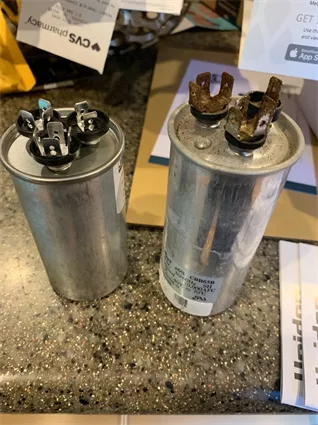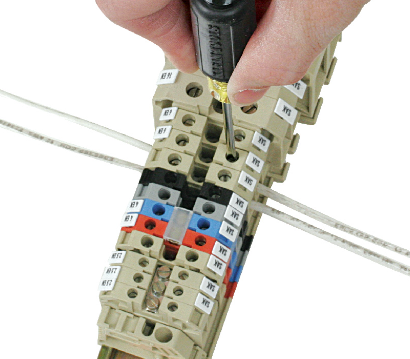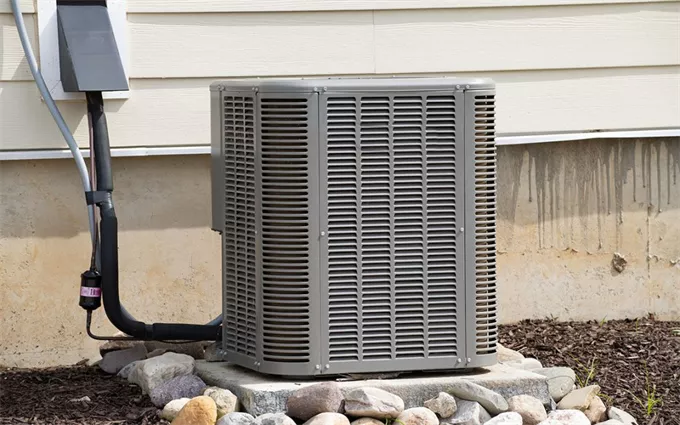Air conditioner capacitors play a crucial role in the operation of HVAC systems. Here is a detailed explanation of their functions:

-
Start Capacitor:
- Starting the Motor: The start capacitor provides an initial voltage boost to help start the motor of the air conditioner. This extra voltage is necessary to overcome the inertia of the motor and set it in motion.
- Creating Torque: By creating a rotating magnetic field, the start capacitor helps generate the torque required to get the motor up and running.
- Temporary Energy Storage: The start capacitor stores energy temporarily and releases it rapidly to facilitate the motor's startup sequence. However, it is disconnected from the circuit once the motor reaches operating speed.
-
Run Capacitor:
- Sustaining Operation: The run capacitor ensures a continuous flow of electricity to keep the motor running efficiently. It stabilizes the voltage supply during the motor's operation.
- Phase Shifting: By creating a phase shift in the motor windings, the run capacitor improves the power factor and efficiency of the motor. This optimizes performance and energy consumption.
- Preventing Damage: The run capacitor helps prevent motor burnout by maintaining a consistent flow of electricity, safeguarding it from voltage fluctuations and overheating.
- Enhanced Performance: Through optimizing electrical characteristics and offering additional torque, the run capacitor improves motor performance, promoting a smoother operation and extended lifespan.
In summary, air conditioner capacitors are critical components that facilitate the startup and continuous operation of the motor in HVAC systems. By providing essential voltage boosts, stabilizing electrical flow, and improving motor efficiency, capacitors play a pivotal role in ensuring optimal performance, energy efficiency, and longevity of air conditioning units. Regular maintenance and timely replacement of capacitors when needed are essential to keep your HVAC system operating smoothly.
How to Know If Your AC Capacitor is Bad
Identifying a faulty air conditioner capacitor is crucial for maintaining the efficiency and proper functioning of your HVAC system. Here are some indications that your AC capacitor may be failing:
-
Air Conditioner Not Turning On: The most common sign of a bad capacitor is when your air conditioner fails to start or takes a long time to start up.
-
Weak Airflow: If you notice reduced airflow coming from the vents, it could be a sign of a failing capacitor impacting the operation of the blower motor.
-
Warm Air Blowing: When the air conditioner is running but is blowing warm air instead of cool air, a malfunctioning capacitor could be the culprit.
-
Constant Cycling On and Off: A capacitor issue can cause the air conditioner to cycle on and off frequently, known as short cycling, which can lead to inefficient cooling and higher energy consumption.
-
Unusual Noises: Strange sounds such as humming, buzzing, or clicking coming from the air conditioner unit may indicate capacitor problems.
-
Visual Inspection: Physically inspect the capacitor for any signs of damage like bulging, leaking oil, or visible corrosion. These are clear indicators that the capacitor needs to be replaced.
-
System Shutting Down: If the air conditioner shuts off unexpectedly or repeatedly while in operation, it could be a result of a faulty capacitor causing the system to malfunction.
-
Higher Energy Bills: A failing capacitor can lead to decreased efficiency in the HVAC system, resulting in increased energy consumption and higher utility bills.
If you notice any of these signs or suspect that your AC capacitor is malfunctioning, it's essential to have a professional HVAC technician inspect the system. They can accurately diagnose the issue, replace the capacitor if necessary, and ensure your HVAC system is running efficiently. Ignoring a faulty capacitor can lead to further damage to the system and potentially result in more significant repair costs down the line.
How to Test Your AC Capacitor
Testing your air conditioner capacitor is a crucial part of troubleshooting HVAC issues and ensuring that your system operates efficiently. Here are steps to test your AC capacitor with a multimeter:
Tools Required:
- Multimeter (set to capacitance mode)
- Safety gloves and goggles
Steps to Test the AC Capacitor:
-
Turn Off Power: Before performing any tests, turn off the power to your air conditioning system at the electrical panel and ensure the system is not receiving any electricity.
-
Locate the Capacitor: Capacitors are usually cylindrical and can be found near the compressor unit or in the air handler unit of the HVAC system.
-
Discharge the Capacitor: Use an insulated screwdriver to short the terminals of the capacitor to discharge any stored electrical charge. Be cautious as capacitors store electrical energy and can give you a shock if not discharged properly.
-
Remove Wires: Carefully remove the wires connected to the capacitor terminals using an insulated screwdriver.
-
Set Multimeter: Set your multimeter to capacitance mode. Choose the appropriate range based on the capacitance rating of your capacitor, which is typically labeled on the side of the capacitor.
-
Test Start Capacitor:
- Place the multimeter leads on the corresponding terminals of the start capacitor.
- Read the capacitance value on the multimeter. Compare this reading to the rated capacitance value of the capacitor. If the reading is significantly lower than the rated capacitance, the capacitor may be faulty and require replacement.
-
Test Run Capacitor:
- Perform the same steps as above to test the run capacitor. Place the multimeter leads on the corresponding terminals of the run capacitor.
- Compare the capacitance reading to the rated value of the capacitor. If the reading is outside the acceptable range, the capacitor is likely defective and needs replacement.
-
Replacement:
- If the capacitor fails the capacitance test or shows other signs of damage, it is recommended to replace it with a new one of the same capacitance rating.
-
Reconnect: After testing or replacing the capacitor, reconnect the wires securely to the capacitor terminals.
-
Power On: Once you have completed testing or replacing the capacitor, turn the power back on and check your air conditioning system to ensure it is working properly.
If you are unsure about performing these tests or are uncomfortable working with electrical components, it is best to contact a qualified HVAC technician to diagnose and resolve any issues with your air conditioner capacitor.
What to Do If Your AC Capacitor Is Bad
If you have determined that your air conditioner capacitor is faulty or not functioning correctly, it is essential to address the issue promptly to ensure the efficiency and proper operation of your HVAC system. Here are steps to follow if your AC capacitor is bad:
-
Turn Off Power: Before taking any further steps, turn off the power to your air conditioning system at the electrical panel to prevent any electrical shocks or hazards.
-
Discharge the Capacitor: Use an insulated screwdriver to discharge any remaining electrical charge in the capacitor by bridging the terminals. Be cautious while discharging the capacitor to avoid any accidents.
-
Remove the Capacitor: Loosen and remove the capacitor from its mounting bracket or compartment by unscrewing any retaining brackets and disconnecting the wires attached to the terminals.
-
Take Note of Capacitor Information: Before purchasing a replacement capacitor, note down the capacitance (in microfarads, µF) and voltage ratings. This information is typically labeled on the side of the capacitor.
-
Purchase a Replacement Capacitor: Acquire a new capacitor with the same capacitance and voltage ratings as the old one. You can find these replacement parts at HVAC supply stores or online.
-
Install the Replacement Capacitor:
- Attach the wires to the terminals of the new capacitor, ensuring that they are connected securely.
- Place the capacitor back in its original position and secure it with any retaining brackets or screws.
-
Restore Power and Test: Turn the power back on at the electrical panel and test your air conditioning system to ensure that the new capacitor allows the system to start and operate efficiently.
-
Professional Assistance: If you are uncomfortable replacing the capacitor yourself, or if you encounter any difficulties during the process, consider contacting a qualified HVAC technician to perform the replacement. They have the expertise and tools necessary to safely replace the capacitor and ensure the proper functioning of your HVAC system.
By following these steps and promptly replacing a faulty air conditioner capacitor, you can help maintain the performance and longevity of your HVAC system while ensuring your comfort during hot weather conditions.
Preventing AC Capacitor Problems
Preventing AC capacitor problems is crucial to ensuring the efficiency and longevity of your air conditioning system. Here are some preventive measures that can help you avoid capacitor issues:
-
Regular Maintenance:
- Schedule routine maintenance checks with a qualified HVAC technician to inspect and tune up your air conditioning system.
- During maintenance visits, have the technician check the capacitors for signs of wear, damage, or reduced efficiency.
-
Cleanliness:
- Keep the area around the air conditioner unit clean and free of debris. Debris such as leaves, grass clippings, or dirt can impact the performance of the capacitors.
- Regularly clean the exterior of the unit to prevent dirt and dust buildup, which can affect the capacitors and other components.
-
Temperature Control:
- Ensure that the area around the air conditioning unit is adequately ventilated and not exposed to extreme temperatures. Excessive heat can shorten the lifespan of capacitors.
- Protect the air conditioning unit from direct sunlight, if possible, to prevent overheating of the capacitors.
-
Voltage Regulation:
- Install surge protectors or voltage regulators to safeguard the air conditioner unit from electrical surges. Voltage spikes can damage capacitors and other electronic components.
- Consider investing in a whole-house surge protector to protect all the electrical devices in your home, including the air conditioning system.
-
Air Filter Maintenance:
- Regularly clean or replace air filters in your HVAC system. Dirty filters can restrict airflow, leading to strain on the system and potentially affecting the capacitors.
- Restricted airflow can cause the system to work harder, potentially leading to overheating and capacitor issues.
-
Timely Repairs:
- Address any issues with your air conditioning system promptly. If you notice any irregularities in the system's performance, such as strange noises, reduced cooling, or frequent cycling, contact a professional technician to diagnose and fix the problem.
-
Proper Installation:
- Ensure that capacitors are installed correctly, with the right wiring connections and mounting. Improper installation can lead to premature capacitor failure and system malfunctions.
By following these preventive measures and staying proactive in monitoring and maintaining your air conditioning system, you can reduce the risk of capacitor problems and enjoy reliable cooling performance throughout the year. Regular maintenance, cleanliness, temperature control, voltage regulation, air filter maintenance, timely repairs, and proper installation are key to preventing AC capacitor issues.


